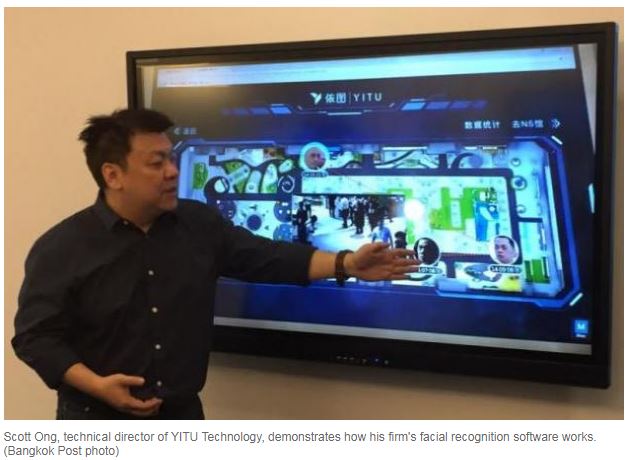AI businesses on the rise in Asean
Singapore is one of the Southeast Asian countries aiming to be a leader and business centre in artificial intelligence (AI) in line with its industrial transformation policy. The so-called Industry 4.0 revolution has been taking place in Asia-Pacific nations, including Thailand, providing significant opportunities for AI development.
“Industry 4.0 is upon us. Robotics, artificial intelligence and additive manufacturing are transforming the way products are built, how operations are managed, and how value chains are defined. Industry 4.0 holds immense opportunities globally, including here in the Asia-Pacific region,” Singapore’s Deputy Prime Minister Tharman Shanmugaratnam told the Industrial Transformation: Asia Pacific (ITAP) exhibition held recently in the city-state.
“It will create interconnected networks of suppliers, partners, and customers, spur innovation and create new jobs, where humans work in collaboration with machines to manage smart facilities,” the minister noted.
With that in mind, Singapore has been committed to research and development (R&D).
“The Singaporean government has committed Scopy9 billion over 2016-2020 toward the Research, Innovation and Enterprise (RIE) category in the RIE2020 national R&D plan,” said Jonathan Lim, director for Startup and Global Innovation Alliance at the Ministry of Industry and Trade.
Mr Lim is certain that Singapore can be a highly profitable market and a central hub for Asean’s AI industry mainly because the country has a strong pool of small and medium-sized enterprises (SMEs) who play an important role in Asia’s economic growth, driven by innovation and productivity.
Secondly, Singapore’s infrastructures, geographical location and business connections with Asian countries make it a good partner. Besides, the country has one of the most vibrant startup ecosystems in the region.
According to Statista, the market research and business intelligence portal, the AI market in Asia-Pacific was estimated to be worth around US$450 million in 2017. AI technologies are used in a variety of situations across consumer, enterprise, and government markets. The term is now used to refer to a variety of technologies, such as machine learning and natural language processing (NLP).
A recent study by leading IT market research and advisory firm IDC found AI adoption in the region was on the rise. With 24.6% of organisations in Indonesia adopting AI, the country leads the pack in terms of adoption, followed by Thailand (17.1%), Singapore (9.9%), and Malaysia (8.1%). The top use cases in Southeast Asia include algorithmic market forecasting (17%), as well as automated asset and infrastructure management (11%), according to the study.
“With its positive impact already visible across banking, manufacturing, healthcare and government, there are clear opportunities for more organisations in Southeast Asia to leverage AI to create differentiating value,” said Chwee Kan Chua, IDC Asia Pacific’s global research director.
“We expect investments in AI to continue to rise, as more organisations begin to understand the benefits of embedding AI into their business and how data and analytics can help uncover new insights. Organisations that do not incorporate AI in their business operations will lose out to their AI-enabled peers who will benefit from the greater predictability, efficiency and innovation that advanced analytics can bring.”
ITAP is the first edition of Hannover Messe event in Asia Pacific, organised by SingEX and trade fair operator Deutsche Messe AG in mid-October. The event was participated by more than 100 exhibiting companies from over 10 countries, such as Siemens, Mitsubishi Electric and Konica Minolta.
According to the Singapore Tourism Board (STB), the city-state has planned to host the 2018 premiere of Industrial Transformation: Asia Pacific. STB and Deutsche Messe AG have signed a memorandum of understanding to organise Industrial Transformation: Asia Pacific for three years in Singapore.
The agreement covers the development of new content and exhibition components for tradeshows, marketing and publicity efforts, as well as possible areas of collaboration in terms of industry knowledge exchange and new tradeshows.
“We are pleased to announce this partnership with SingEx, which stems from a year of discussions. Industrial transformation is an important business platform in Asia-Pacific that highlights how the Fourth Industrial Revolution is changing production, logistics, and knowledge transfer,” said Jochen Köckler, CEO of Deutsche Messe AG.
“We are confident of strong participation from regional industries as they look forward to an exciting and innovative event platform,” said SingEx CEO Aloysius Arlando.
A number of investors and high-tech firms in Asia find Thailand an interesting market for AI. Those include YITU Technology, a Singapore-based company, which took part in the public security conference IFSEC Southeast Asia to showcase its AI technologies.
“Regarding the economic expansion of the AI business in Thailand, the robotic, digital, medical, and healthcare industries show growth opportunities in particular,” said YITU’s technical director Scott Ong.
YITU’s facial recognition technology has been deployed at large-scale events, such as the G20 Summit, BRICS Summit and the BOAO Forum for Asia.
Its facial recognition algorithms have been validated by independent evaluation laboratories. YITU has ranked first in the Face Recognition Vendor Test in Singapore for two consecutive years from 2017 to 2018. The company’s facial recognition (cardless ATMs) system has been rolled out across China Merchants Bank’s network of 2,000 ATMs in China.
Meanwhile, a report by OpenGov stated that AI was first taught in Thailand at government universities over three decades ago, but the industry only took off in the country in early 2010s. In 1992, the first AI laboratory was established at the Department of Computer Engineering, Kasetsart University.
During 2000s, AI industry started to develop rapidly because tools for storing, processing, and accessing knowledge were needed. Since then, research on AI has been put in Thailand’s national economic and social development plan. Currently backed by the Ministry of Information and Communication Technology, AI is set to bring Thailand on par with global development.
Although Thailand has signed free trade agreements, as well as bilateral and multilateral agreements with different countries to support economic expansions for all industries, the country still needs to be more active in order to be fully ready for AI adoption.
According to an analysis by data analytic firm SAS, Thailand has the largest percentage of organisations reporting that a shortage of technical skills is the top barrier to AI adoption.
Coupled with the fact that 80% of organisations in Thailand deem AI capabilities critical for their organisations’ future competitiveness, the highest in Asean, it is clear there is a mismatch between the perceived urgency of AI adoption and the available means to address it. Proper leverages, tools and platforms must therefore be found to alleviate the impact of talent shortage.
“AI and analytic empower people and are the drivers of organisational success. It is great to see that so many organisations in Thailand are cognisant of the enhanced productivity and efficiency that embracing AI can bring,” said Nutapone Apiluktoyanunt, managing director of SAS Thailand.
However, skill shortages are a very real challenge and one that demands action. It is vital for Thai businesses and public sector organisations to partner together to develop the right data analytic skill sets and make analytics accessible to all, he noted.

Source: https://www.bangkokpost.com/business/news/1566366/ai-businesses-on-the-rise-in-asean


 English
English




